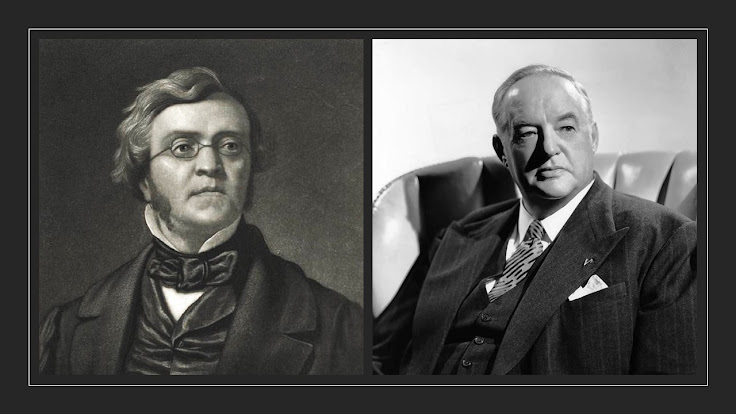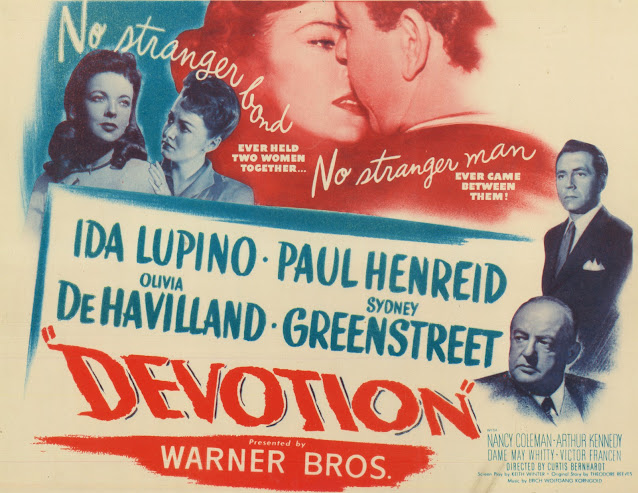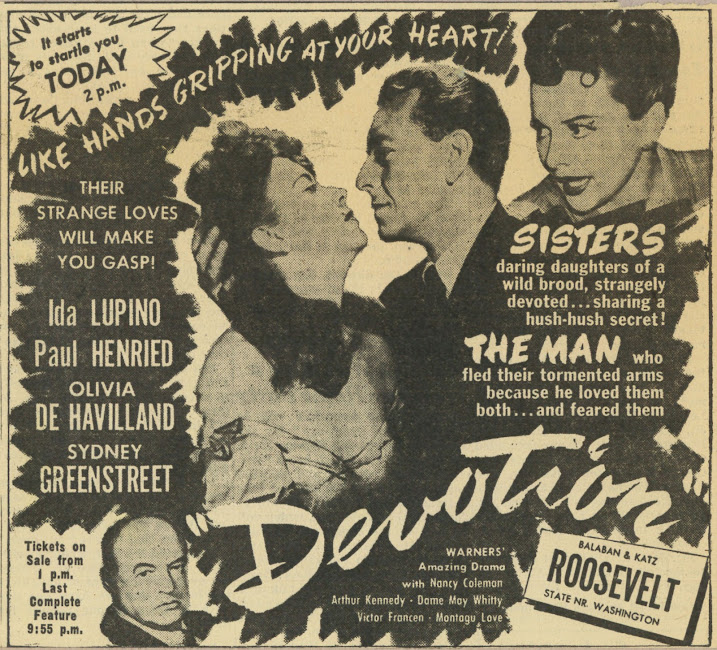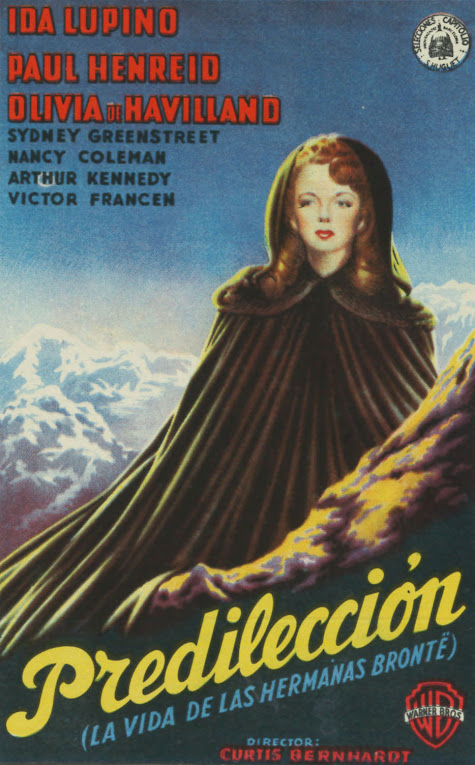Would DEVOTION Please Ones Devoted to the Brontes?
Literary History As Warners Would Have It
Show of hands for Bronte Society members! There are many, worldwide, more than belong to any movie fan clutch. The Brontes go back past 170 years. Still you’d think they were alive for reverence they inspire. Charlotte (Jane Eyre), Emily (Wuthering Heights), support members (Anne, tragic brother Branwell) remain objects of feverish research and veneration. Think what we do picks nits? Try going against a Bronte scholar and see how long you last. I lately finished a book called The Bronte Myth, by Lucasta Miller, who tells us for 288 pages how fascination for the family never ended, scarcely paused, after last of siblings Charlotte packed off to eternity (1855). The author reviews various films spun off Bronte output, the 1944 Jane Eyre (but oddly not the 1934 version with Virginia Bruce and Colin Clive), Wuthering Heights (1939), and most notorious to her thinking, Devotion, the Warners Bronte bio, finished in 1943 but not released until 1946. We know the latter for Ida Lupino playing Emily, Olivia DeHavilland as Charlotte, and Nancy Coleman as Anne, Arthur Kennedy being Branwell. We can enjoy Devotion or not for having less at stake re accuracy, less that is unless one regards this literary family as sacred figures, which for many they very much are.
Lucasta Miller says Devotion “twisted the facts without aspiring to any form of higher truth … submerged the sisters in a bath of romantic and wildly inaccurate slush …” Not unexpectedly, I am here to defend Devotion, having re-visited it twice in as many weeks, and ready to take up cudgels in Warner’s defense. Firstly, too much bow to historic characters will stultify your movie. Ticket buyers are seldom there to deepen knowledge, especially of schoolbook sort. And what were the Brontes to a mass audience in 1946? Devotion’s theatrical trailer does not even mention them, and neither did posters. There had been popularity of Wuthering Heights and Jane Eyre on screen, but interest was for romance and stars, not source novelists. If these sisters can’t be ginned up for the sake of drama and conflict, why tell their saga at all? Simple enough to plug Brontes into Warners’ narrative formula, and let fans have it or leave it. Purists would revile whatever Hollywood attempted along these lines, piling vitriol on liberties necessarily taken. Devotion was held from release for three years. Stills had shown up in 1943 fan publications, so those who cared knew the Bronte story was waiting in wings. Critics remembered too and laid for Devotion until finally it floated in upon postwar waves. “A three-year-old strip of damp bark off Warners’ wartime backlog,” said James Agee, who amusingly called it “Little Women on an overcast day.”
 |
| Thackeray Played by Greenstreet? I Can Buy It |
Here was where mainstream critics showed off cultivation by sticking pins in poor donkey that was Devotion, a movie meant to be nothing other than triangle fireworks spun off combo of Ida Lupino and Olivia De Havilland, “strange sisters” squabbling over dubious prize that was Paul Henried, while possibly sinister Sydney Greenstreet observes. These people were going to play to their personas no matter what, so being Brontes was good as essay of the Andrews sisters so far as image-conscious actresses thought. Did anyone ask Lupino-DeHavilland-Coleman if they read or studied the triumvirate? They’d no doubt reply yes, but I’ll guess investigation went no further than scripts driven by WB messenger to their respective digs or agent office. As to “Fat Man” Sydney Greenstreet (you wonder how such billing jabbed this distinguished player, time after humiliating time), there was forever expectation he’d be up to Casper Gutman tricks again, The Maltese Falcon having encased him in casting concrete. Greenstreet portrays William Makepeace Thackeray for a mid-point extended cameo to lend humor/color to otherwise solemn Devotion, yet publicity/ads saw him purely on Gutman terms (“the “Friend” … they couldn’t fool him --- they couldn’t trust him!”). Such was bolt and key to confine Gold Age contract talent. You had to pay into Devotion to enjoy what was a delightful departure from norm the Thackeray part was for Greenstreet.
Devotion has resonance and Bronte-relevance few could have seen coming in 1946. Charlotte and Emily of the real-life clan were co-opted by a nascent feminist movement that gathered steam for decades to precede and follow Devotion, these being role models for many. Warners knew it took dynamic and respected stars to play them. Heroines for the sisterhood came no better picked than Ida Lupino and Olivia DeHavilland, as fates turned out. Lupino after Devotion would begin a directing career unique to actresses hitherto limited to acting. She’d not live long enough to enjoy huzzahs of Blu-Ray box sets and celebration as a history maker, but make history she did, so yes, put her to equal stature with Emily Bronte, that is whenever we are finally ready to assign movies respect equal to literature (a day not yet arrived). Regard too Olivia DeHavilland, the rebel slave who broke contract chains at Warners, did her walkout, took it to courts, beat the Brothers soundly. Did Charlotte Bronte on her best day show such spunk? Devotion can be viewed in terms of two modern women staging and winning struggles not unlike the Brontes might have done given greater advantage than was possible in a first half of the nineteenth century. If you’re going to pitch Devotion to a current audience, pitch it this way.
Everything relative to the Bronte’s “Haworth” village was mocked-up by Warners, indoor moors, a parsonage constructed within stage walls, inside plus exterior, little of Haworth done under sun save one shot of a carriage driven off. This was reality of war years, but so artfully done that lovers of artifice (Me! Me!) might prefer it to a real thing. Besides, Haworth of so long ago was a nightmare to truly disturb sleep. The place was rotten with disease, mostly “consumption” (TB), life expectancy an appalling twenty-four years. 40% of children were dead by age six. The water which people drank seeped through graves with dead barely laid beneath heavy stones. Paterfamilias Bronte as vicar sometimes conducted eight funerals in a single day. An honest Bronte depiction would have been better produced by Val Lewton (a swell idea actually), as here was truly an isle of the dead. The Bronte parsonage was fronted by a cemetery choked to capacity, while the back opened to spooky moors that inspired Emily to write Wuthering Heights. She was understood, at least remembered, as a mystic driven more by supernatural force than creative impulse to inspire the radical book that Wuthering Heights proved to be.
 |
| Nothing To Suggest Period Setting Here |
 |
| Chicago Goes Whole-Hog With Saucy Sell |
For that matter, Charlotte’s Jane Eyre proved hot stuff for its time, many convinced that proper young women should not pen such violent emotion. Jane Eyre proved to be the big seller in its day however, Charlotte received by London literary circles, embraced by notables, though one hostess noted her “shattered” teeth, chill reminder that in those dental-deprived days, precious few held onto healthy mouths for long. But then that was case also for many stars of a Hollywood to come, lovely teeth yes, but too often not their own. Devotion takes expected course in letting Charlotte/Emily succumb to varied loves and be disappointed by them, just like in the movies. What drove WB more than history was their own successful string of sister showdowns that so far encompassed In This Our Life and The Hard Way, DeHavilland having starred on one, Lupino in the other. Maybe it was parted sneer that made Warners give Lupino billing over DeHavilland, Paul Henried also as object of rivalry, DeHavilland placed third, a sorry spot for someone who’d served Warners well for over ten years. Should she not have placed first, if not alongside Lupino over the title? Maybe that’s what made Olivia cuss so colorfully in a blooper from Devotion that WB ran for Christmas parties in 1946.
Lupino gets also the big “entrance” scene so that we know from a start that Emily will be our focus, even as Charlotte dominates for a second half, plus getting most daring of content, being kissed forcibly by Henried (“You are fortunate, Miss Charlotte, that I am not a woman beater”) and Victor Francen as married mentor at a girl’s academy who steers Charlotte into a carnival’s tunnel of love. Director Curtis Bernhardt said years later that he liked doing Devotion because he was “interested” in the Brontes, which may well have separated him from most others present, while Nancy Coleman recalled from years forward that Lupino and DeHavilland got along well after initial clashing, to a point where they called afternoon teas to recognize shared Britishness (OdeH parents were of Brit origin and Lupino was raised there). Coleman, being American, was not invited to the teas, but did not care. Extras did however, and so staged their own teas specifically to include Nancy and get the snob stars’ goat. What a beehive, or hornet nest, was Classic Era picture-making. Devotion can be had from Warner Archive, could use a fresh transfer, someday perhaps to High-Def, though I can’t imagine it being high on Warners’ priority list.


















11 Comments:
Very enjoyable piece. Count me in as one of those fonder of 40's fireworks from Warner stars than of historical accuracy. And I have a collection of books by and about the Brontes. To my mind,Ida Lupino's Emily Bronte stands as a very honorable entry in her admittedly large body of exceptional performances.
Warner Archive ought to put you on their payroll. You do a superlative job of sparking interest in what he write about.
And once again, the people in charge of advertising feature the stars wearing only 1940s clothes in a 19th-century period piece. Funny how studios spent lots of dough on costume pictures, only to make sure nobody realized what they were really were.
Oh, and count me in, too, on soundstages standing in for exteriors in Golden Age movies. Much easier to get lost in the fantasy.
I've seen Devotion twice, am aware of its historical inaccuracies, yet thoroughly enjoy it as a melodrama typical of its era. I enjoy pairing it with the (in my mind superior) near-contemporary moor-based Lupino vehicle "Ladies in Retirement" (a film that deserves to be much better known than it is -- I see that you've never written about it, in 15 years of blogging?).
Have only seen LADIES IN RETIREMENT once, years ago. Should probably revisit it.
Nice overripe Erich Maria Korngold music score as well
I think Ida Lupino is often seriously underrated. Watch her in THE LIGHT THAT FAILED, or THEY DRIVE BY NIGHT, or enjoy her directing skills in THE HITCH-HIKER, or THE MASKS (Twilight Zone). You'll see what I mean.
I've always liked Ida Lupino as an actress and director but did not realize until recently that she was British. Does she have an apparent accent in any of her earliest films?
Dan Mercer revisits the 1934 JANE EYRE:
I have seen the 1934 Monogram production of “Jane Eyre,” and though I should like to report that it is at least a minor classic, I found it to be a thoroughly pedestrian adaptation by a hack director, Christy Cabanne, with little in the way of atmosphere or fidelity to its source. I would have thought that Colin Clive, that high strung, neurotic actor, would have offered at least an interesting interpretation of Rochester, but except for a moment’s petulance at the beginning, he is too much at ease and laughs too readily. As Jane, Virginia Bruce is, well, beautiful, with the sort of beauty that might have emerged from a courtly romance but not the gloom of Thornfield Hall, with its revelations of the torments of the spirit. When Joan Fontaine played Jane, her mother said that she had been defeated by her beauty. Alas, Virginia Bruce’s beauty is defeated by the bathos that characterizes this “Jane Eyre.”
Dan Mercer on the Korngold score for DEVOTION:
The film score by Erich Wolfgang Korngold for “Devotion” is one of his strongest. The melodies are exquisite and there is a dark and turbulent episode as Emily is swept away by a cloaked horseman representing death. Yet a biography of the composer wonders whether his novelty value had worn off for Warner Brothers or was it merely bad luck that he was being offered second-rate films to score. Among such was this one, described as having a script that was “stilted and uninspired.”
I don’t believe that either circumstance was quite the case. Korngold arrived in Hollywood with a massive reputation as a serious composer. Warner Brothers exploited it by employing him on its most expensive and prestigious productions of the period, such “Captain Blood,” “Anthony Adverse,” and “Adventures of Robin Hood.” With the coming of the war, however, such productions could no longer be mounted. The “second rate” films that Korngold began working on were in fact the studio’s standard “A” product.
At that, however, Korngold labored under a serious handicap, compared to his studio colleague, Max Steiner. Korngold wrote and arranged all the music for his films. Steiner did not. No less brilliant or creative than Korngold, Steiner would usually write the main themes and provide sketches of the other music for his films, which he would allow staff composers to arrange and orchestrate under his supervision. It was the key to his massive output. But Korngold could not work like that.
Korngold also chafed at the schedule he was expected to keep, not working as he had in the past, when he felt inspired, but being given a project he might be uninterested in and hadn’t sought. Of these films, only “The Constant Nymph" fully engaged him.
Supposedly, Max Steiner teased him that his film music had declined in quality while his own had improved. Korngold replied, “Maxie, you’re absolutely right and I’ll tell you why. I’ve been stealing from you and you’ve been stealing from me!”
When David O. Selznick invited him, Miklos Roza, and Franz Waxman to score sample scenes for a movie before it was assigned to one of them, Roza and Waxman were furious. Korngold simply refused, with the wry comment, “What if I should win?”
In fact, the film music Korngold wrote is not only among the best ever for Hollywood films, but among the best he would write in his career. Even when he left Hollywood, it would continue to resonate in some of the best works he would write in his remaining years, such as his Violin Concerto, which was based on the main theme from “The Prince and the Pauper,” or a lieder song, “Gluckwunsch” (“Congratulation”) from “Devotion.”
I don’t doubt that “Devotion” bears no more resemblance to the lives of the Brontes than the version of the portrait of his sisters by Branwell Bronte used in the film does the one actually painted. I find it enjoyable for the performances of the cast, especially by Ida Lupino and Arthur Kennedy, the atmospheric settings, which, indeed, seem all the more the product of a disturbed mind for their artificiality, and, not least, the rich and perceptive score by Erich Wolfgang Korngold, which breathes the secrets of the tormented as the dialog could not.
With all the subterfuge and concealment of the period setting of DEVOTION by the Warners promotional/advertising gang, I would be curious to know just how the film ended up faring at the boxoffice. I think that WB could have played up the prestige angle along with the romantic appeal instead of misleading their potential audience as brazenly as the ads display.
Post a Comment
<< Home